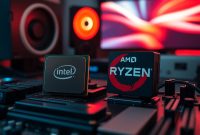PC enthusiasts often seek powerful performance without the accompanying noise that traditional setups produce. As you initiate on building your […]
Komputer Mania
NVIDIA RTX 4070 Super Review – Is It Worth the Upgrade?
It’s time to investigate the NVIDIA RTX 4070 Super, a graphics card that has generated much excitement within the gaming […]
10 Common PC Problems and How to Fix Them Yourself
Just when you think everything is running smoothly, common PC problems can crop up and throw a wrench into your […]
CChoosing the Right Power Supply – Wattage, Efficiency, and Brands
Efficiency plays a vital role in ensuring your computer or electronic device runs smoothly and reliably. When opting for a […]
Intel vs AMD – Which CPU Reigns Supreme This Year?
Many tech enthusiasts find themselves torn between Intel and AMD when choosing a CPU for their next build. In today’s […]
How to Build a Gaming PC in 2025 – Step-by-Step Guide
Most gamers know that building your own gaming PC can offer superior performance and customization compared to pre-built options. In […]
How to Diagnose a Failing Hard Drive – Signs and Tools
There’s nothing more frustrating than losing access to your data due to a failing hard drive. Knowing the signs of […]
PC Running Slow? 7 Quick Fixes to Boost Speed
There’s nothing more frustrating than a slow PC hindering your productivity. When your computer starts lagging, it’s easy to feel […]
How to Lower Your CPU Temperature Without Upgrading Hardware
Just like any high-performance engine, your CPU can overheat, leading to performance issues and potential damage. Fortunately, you don’t need […]
NVIDIA and AMD Announce New GPUs – Here’s What You Need to Know
Just when you thought the graphics card market couldn’t get more exciting, NVIDIA and AMD have both unveiled their latest […]
- 1
- 2









